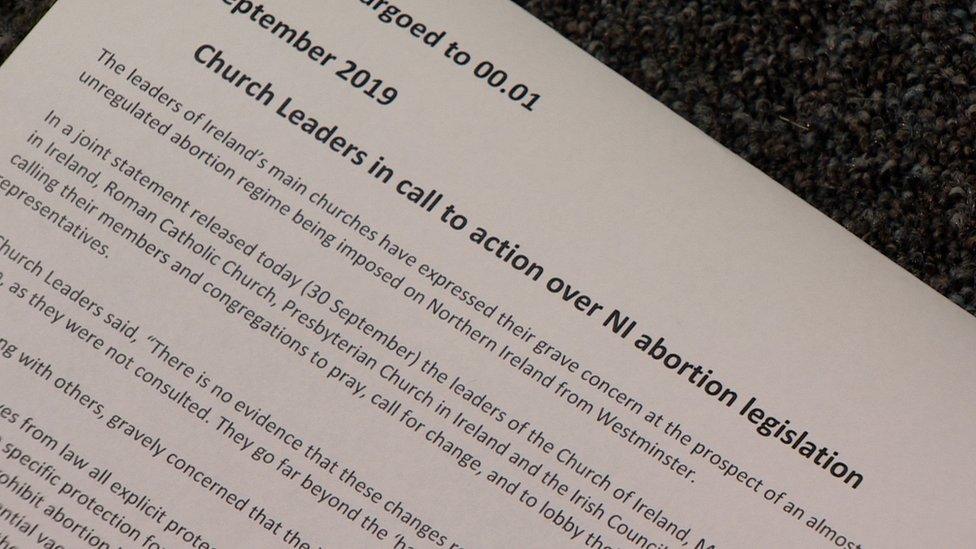Abortion: Presbyterian Church urges Irish language deal before law change
- Published
Parties need to "set aside red lines", says Presbyterian minister
A Presbyterian minister has called for compromise on the Irish language ahead of a possible liberalisation of abortion laws in Northern Ireland.
The leaders of Ireland's main churches are concerned that unless the assembly is restored by 21 October, abortion restrictions will reduce significantly.
The Irish language is a major sticking point in the Stormont deadlock.
The Presbyterian Church's general secretary said abortion changes should "not be imposed" without scrutiny.
"We're saying to all parties that people need to set aside their red lines," said the Reverend Trevor Gribben.
"The issue of unrestricted abortion is too serious to be having what are pointless debates over the Irish language.
"The Irish language is no threat to me."
Abortion is only permitted in Northern Ireland in circumstances where continuing a pregnancy would mean there's a serious and permanent risk to a woman's health.
'Not giving in'
In a statement, the Democratic Unionist Party (DUP) said it was "the only consistently pro-life executive party" and it wanted to restore devolution without "pre-conditions".
It added that DUP leader Arlene Foster had "offered to legislate for the Irish language" in August 2017 but said this was "rejected by Sinn Féin within 90 minutes".
"We will form an executive immediately without any pre-conditions. It's time for Sinn Féin to lift its boycott," the statement said.
Sinn Féin said the DUP was "attempting to take the public for fools".
The party said the DUP walked away from an agreement in February 2018, which included an Irish language act, and have not engaged in a meaningful way since.
'Get back to Stormont'
In addition to his role as general secretary, Mr Gribben is also clerk of the Presbyterian Church in Ireland's General Assembly.
"Many of my fellow citizens who are Catholic, or are nationalist, the Irish language is very important to them," he said.
"It's not a campaign, it's not giving in to republicans to agree sensible Irish language legislation - let's do that and get back to Stormont."
In a joint statement, the leaders of the Church of Ireland, the Methodist Church in Ireland, the Roman Catholic Church, the Presbyterian Church in Ireland and the Irish Council of Churches have requested a meeting with Northern Ireland Secretary Julian Smith before 21 October.

Leaders have requested a meeting with the Secretary of State before 21 October
"Our Northern Ireland political parties have it in their own hands to do something about this," said the church leaders.
"They all need to take risks and make the compromises necessary to find an accommodation that will restore the devolved institutions."
The Church of Ireland said the right to life was paramount and its protection must be a higher priority than any other political issue.
Grainne Teggart of Amnesty International said there "must be no return to Stormont" before 21 October "without abortion reform agreed on exactly the same terms as has been secured at Westminster".
"These rights have been long and hard fought for and we will not accept these being sacrificed for political expediency," she added.
"It would be foolhardy of any political party to think otherwise."
'A duty'
In England, Scotland and Wales, laws that criminalised abortion were changed by the 1967 Abortion Act, which allowed an abortion to be legally carried out up to a 24-week limit.
It was also made legal beyond that in cases in which the mother's health is threatened or if there is a substantial risk the baby will have serious disabilities.
But those changes did not apply to Northern Ireland, which had its own parliament.
In July, in the absence of a functioning Stormont government, MPs passed the Northern Ireland (Executive Formation) Act, which contained a provision placing a duty on the government to regulate to provide for access to abortion in Northern Ireland.
It comes into effect if the Stormont executive is not restored by 21 October, with regulations required to be in place by the end of March 2020.
Several rounds of talks aimed at restoring the Northern Ireland Assembly have faltered.
Sinn Féin and the DUP have failed to find a compromise on a number of outstanding issues including Irish language rights and the legalisation of same-sex marriage.
- Published9 July 2019

- Published25 September 2019
